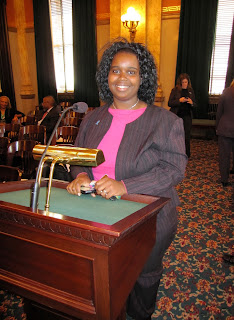Foster Youth Community Notification Provisions
Representatives Lou Blessing and Tracy Heard, Sponsors
Good evening Chairman Grendell, Vice-Chairman Obhof, Ranking Member Turner and members of the Senate Judiciary-Criminal Justice Committee. I am Arlene Samuel Jones and I am caseworker at a Public Child Serving Agency, a wife, mother, caregiver, productive member of society and a foster care alumnus. Today I stand before you not as representative of my agency, but as a member of society, mother, caregiver and a foster care alumnus. I greatly appreciate you taking the time to hear my testimony.
I first want to express my deepest and sincere gratitude for the recent addition of $2 million in support of foster youth making the transition into adulthood. This is a very scary stage of foster care and your support at this point in a foster youth’s life deserves recognition. Thank you for your investment in the leaders of tomorrow today.
Today I stand before to express my opposition to the provision added to Sub. HB 86 entitled Foster Youth Community Notification Provision. This provision will require that information about youth who have been identified as “special needs” and placed into treatment homes be shared with members of the community. I am opposed to such notification on the grounds that it places these identified youth at further risk for harm, it promotes false assumptions and stigmatizes foster youth beyond the presumed notions that are already prevalent in our society, it is discriminatory and does not protect a youth’s right to confidentiality.
In Ohio, a school can preclude a student from attending their school based on certain information, which can include diagnoses that have been linked with behavioral issues. If we let this provision stay in this bill and provide school officials with the information that this provision is requiring to be released, school officials at certain schools will not accept a student based on this information, thereby placing foster youth at further risk as we all know that education is the key to success in life. If we as a foster youth cannot get this education from an institution that our caregiver believes is best for us, we are doing more harm than good. In addition to this, these identified special needs foster youth will automatically be targeted as the culprits of criminal activity that occurs within the neighborhood, which will also increase vulnerability as they will become scapegoats in the community and could potentially be the target of vigilante justice or some type of retribution. This directly contradicts what public child serving agencies are supposed to do; provide a safe home for youth who are placed in out of home care.
This provision also inadvertently promotes the false assumption that we as foster youth are “bad” kids. Per current statute, community notification is required for sexual offenders as they have committed acts against someone. When we are placed in the custody of a PCSA it is usually not a result of our own actions and should not be treated as if we have done something wrong, which also stigmatizes us. Compounding this false assumption and stigmatization is the inherent discrimination against foster youth. I have a son who would more than likely be identified as “special needs” child, yet there are no provisions stating that I must provide notification of my residence, my son’s name, age and other identifying information to people in our community. Best practices indicate that foster youth should be provided with as much normalcy as possible, and this provision does not promote the normal life that we as foster youth so desperately yearn for.
In fact, if some of the information that will be required to be released were sent out to community members on any other child, namely a child who is not in the care of PCSA, there would be parents and caregivers protesting the release of information that is supposed to be confidential, i.e. facts surrounding diagnosis, delinquency charges and related facts, age and other identifying information.
I have heard on several occasions that too often, Ohio is reactive in its legislative process instead of proactive. I heard this very statement at this Statehouse during a press conference celebrating the passage of the Marcus Fiesel Bill and just yesterday from a colleague of mine. We cannot penalize the foster youth of tomorrow and do so in the name of safety because someone who was in foster care did not fare so well. As a famous musician once said, “You can plan a pretty picnic, but you can’t predict the weather.”
In closing, I would like to again express my gratitude for your support of foster youth who are transitioning into adulthood. I respectfully request that the Foster Youth Community Notification Provisions be removed from Sub. HB 86. Thank you so much for listening to my testimony. I would be more than happy to answer any questions that you may have at this time.














